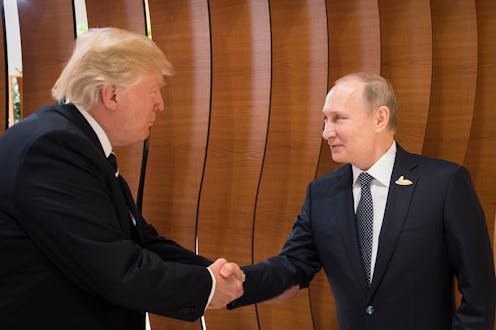News
Why This $30,000 From Russia Is Making People Scream “Collusion”

There's a new twist in the investigation over Russia's role in the 2016 U.S. presidential election, with BuzzFeed reporting on the FBI's scrutiny of Russian wire transfers tagged "2016 election". Each transaction is reported to have come from the Russian foreign ministry before making its way to Russian embassies in countries throughout the globe.
That Russia meddled in the 2016 U.S. presidential election has been known for some time now (the intelligence community published its official assessment on Russian activities in the election in January 2017). How that plan was financed has remained a larger mystery.
Interestingly, the transactions don't seem to have been very well-hidden, with most containing "a memo line referencing the financing of the 2016 election." One transfer in question, from August 2016, shows roughly $30,000 from the Russian foreign ministry being deposited to the Russian embassy in Washington, D.C. BuzzFeed reported that the transfer came from a Kremlin-backed bank, "landed in one of the embassy’s Citibank accounts and contained a remarkable memo line: 'to finance election campaign of 2016.'"
Some journalists took to Twitter after the news broke to note how "helpful" it was for the Kremlin to include such an explicit line in a memo. Still, others pointed out that there were other elections taking place in 2016 — including in Duma, Russia — and that the line isn't necessarily in reference to the U.S. presidential election.
What is clear is that the money from the wire transfers made its way to Russian embassies in almost 60 countries between August and September 2016, the months leading up to the U.S. presidential election. What remains unclear, however, is how the funds were used.
A Citibank review has turned up dozens of similar transactions, BuzzFeed reported, all of which are suspicious in that the bank's compliance officers have been "unable to determine the financial, business, or legal purpose of the transactions."
Earlier this week, CIA Director Mike Pompeo stood by the U.S. intelligence assessment that Russia meddled in the 2016 election, though the president himself has vacillated between saying that he believes Putin (who has denied meddling in the election) and saying he believes his own intelligence agencies.
Former intelligence officials have recently expressed worry that the president is being manipulated by Putin, with former CIA Director John Brennan and ex-National Intelligence Director James Clapper both saying Trump has mishandled Moscow's ties to the election.
As Seva Gunitsky, a politics professor at the University of Toronto, pointed out on Twitter, adding the words “2016 election” to a wire transfer that could be illegally financing an election seems laughably obvious.
But, as Gunitsky has noted before, following Russia’s money trail is sure to be an integral part of the FBI’s investigation. In a July 2017 Twitter thread, Gunitsky theorized that Russia’s meddling might have less to do with power, and more to do with recouping losses owed to them by Donald Trump.
In other words, many believe that the Russians may have helped Trump get elected (even potentially going so far as to finance portions of his campaign) so that he will eventually pay them back.
An FBI agent told BuzzFeed that the memo line attached to the wire transfers were solid leads, as obvious as they may seem. “How could we not investigate a suspicious financial transaction that contained a memo that said, ‘finance election campaign 2016? Given the climate and what was in that memo line it would be very irresponsible for us not to investigate.”
Though by no means proof of collusion, the report is making waves, with many going so far as to call it a bombshell and an “explosive scoop” in the Russia investigation.
As Business Insider correspondent Natasha Bertrand notes, the infamous Steele dossier (a collection of documents gathered by a former British spy and originally intended as political opposition research), seems to allude to the transfers, noting that “tens of thousands of dollars were involved” in the scheme in embassies in the U.S.
Though the dossier has been called "fake" by the Trump administration, the FBI has taken it seriously enough to question its author. It's also worth noting that several portions of the dossier have been corroborated, including conversations intercepted during routine intelligence gathering.